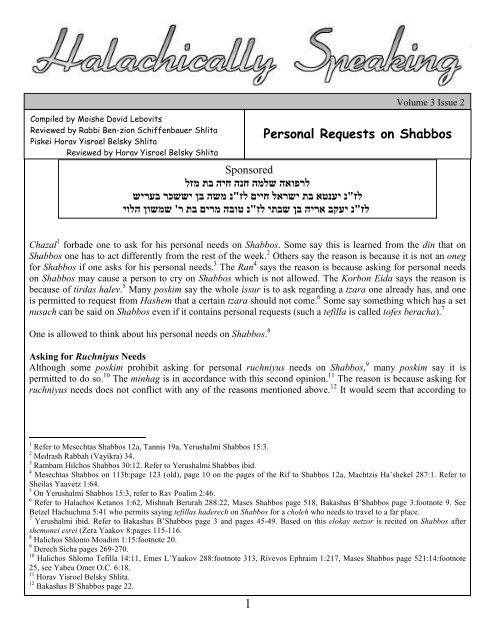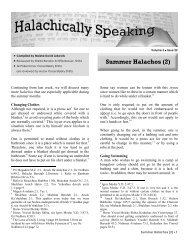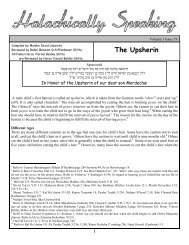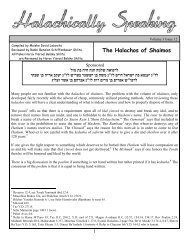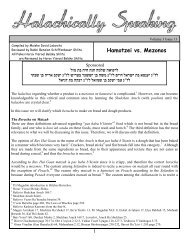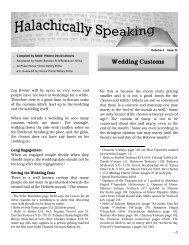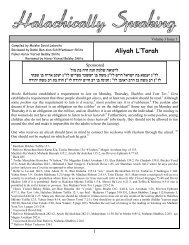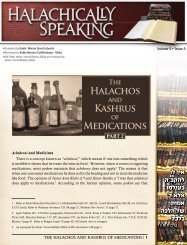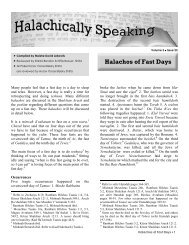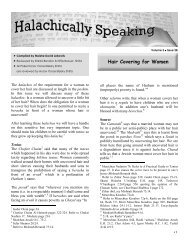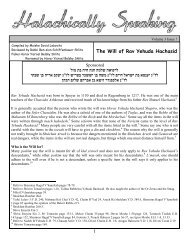1 Personal Requests on Shabbos - Halachically Speaking
1 Personal Requests on Shabbos - Halachically Speaking
1 Personal Requests on Shabbos - Halachically Speaking
Create successful ePaper yourself
Turn your PDF publications into a flip-book with our unique Google optimized e-Paper software.
<strong>Halachically</strong> <strong>Speaking</strong>Compiled by Moishe Dovid LebovitsReviewed by Rabbi Ben-zi<strong>on</strong> Schiffenbauer ShlitaPiskei Horav Yisroel Belsky ShlitaReviewed by Horav Yisroel Belsky ShlitaSp<strong>on</strong>soredVolume 3 Issue 2<str<strong>on</strong>g>Pers<strong>on</strong>al</str<strong>on</strong>g> <str<strong>on</strong>g>Requests</str<strong>on</strong>g> <strong>on</strong> <strong>Shabbos</strong>לרפואה שלמה חנה חיה בת מזללז"נ יענטא בת ישראל חיים לז"נ משה בן יששכר בערישלז"נ יעקב אריה בן שבתי לז"נ טובה מרים בת ר' שמשון הלויChazal 1 forbade <strong>on</strong>e to ask for his pers<strong>on</strong>al needs <strong>on</strong> <strong>Shabbos</strong>. Some say this is learned from the din that <strong>on</strong><strong>Shabbos</strong> <strong>on</strong>e has to act differently from the rest of the week. 2 Others say the reas<strong>on</strong> is because it is not an <strong>on</strong>egfor <strong>Shabbos</strong> if <strong>on</strong>e asks for his pers<strong>on</strong>al needs. 3 The Ran 4 says the reas<strong>on</strong> is because asking for pers<strong>on</strong>al needs<strong>on</strong> <strong>Shabbos</strong> may cause a pers<strong>on</strong> to cry <strong>on</strong> <strong>Shabbos</strong> which is not allowed. The Korb<strong>on</strong> Eida says the reas<strong>on</strong> isbecause of tirdas halev. 5 Many poskim say the whole issur is to ask regarding a tzara <strong>on</strong>e already has, and <strong>on</strong>eis permitted to request from Hashem that a certain tzara should not come. 6 Some say something which has a setnusach can be said <strong>on</strong> <strong>Shabbos</strong> even if it c<strong>on</strong>tains pers<strong>on</strong>al requests (such a tefilla is called tofes beracha). 7One is allowed to think about his pers<strong>on</strong>al needs <strong>on</strong> <strong>Shabbos</strong>. 8Asking for Ruchniyus NeedsAlthough some poskim prohibit asking for pers<strong>on</strong>al ruchniyus needs <strong>on</strong> <strong>Shabbos</strong>, 9 many poskim say it ispermitted to do so. 10 The minhag is in accordance with this sec<strong>on</strong>d opini<strong>on</strong>. 11 The reas<strong>on</strong> is because asking forruchniyus needs does not c<strong>on</strong>flict with any of the reas<strong>on</strong>s menti<strong>on</strong>ed above. 12 It would seem that according to1 Refer to Mesechtas <strong>Shabbos</strong> 12a, Tannis 19a, Yerushalmi <strong>Shabbos</strong> 15:3.2 Medrash Rabbah (Vayikra) 34.3 Rambam Hilchos <strong>Shabbos</strong> 30:12. Refer to Yerushalmi <strong>Shabbos</strong> ibid.4 Mesechtas <strong>Shabbos</strong> <strong>on</strong> 113b:page 123 (old), page 10 <strong>on</strong> the pages of the Rif to <strong>Shabbos</strong> 12a, Machtzis Ha’shekel 287:1. Refer toSheilas Yaavetz 1:64.5 On Yerushalmi <strong>Shabbos</strong> 15:3, refer to Rav Poalim 2:46.6 Refer to Halachos Ketanos 1:62, Mishnah Berurah 288:22, Mases <strong>Shabbos</strong> page 518, Bakashas B’<strong>Shabbos</strong> page 3:footnote 9. SeeBetzel Hachuchma 5:41 who permits saying tefillas haderech <strong>on</strong> <strong>Shabbos</strong> for a choleh who needs to travel to a far place.7 Yerushalmi ibid. Refer to Bakashas B’<strong>Shabbos</strong> page 3 and pages 45-49. Based <strong>on</strong> this elokay netzor is recited <strong>on</strong> <strong>Shabbos</strong> aftershem<strong>on</strong>ei esrei (Zera Yaakov 8:pages 115-116.8 Halichos Shlomo Moadim 1:15:footnote 20.9 Derech Sicha pages 269-270.10 Halichos Shlomo Tefilla 14:11, Emes L’Yaakov 288:footnote 313, Rivevos Ephraim 1:217, Mases <strong>Shabbos</strong> page 521:14:footnote25, see Yabea Omer O.C. 6:18.11 Horav Yisroel Belsky Shlita.12 Bakashas B’<strong>Shabbos</strong> page 22.1
<strong>Halachically</strong> <strong>Speaking</strong>those poskim who permit <strong>on</strong>e to ask for ruchniyus requests <strong>on</strong>e would be able to daven for a shidduch <strong>on</strong><strong>Shabbos</strong>. 13Techina at Hadlukas NeirosAt the time of candle lighting a woman should daven for her children to be successful in Torah. 14 There is noc<strong>on</strong>cern of asking for pers<strong>on</strong>al needs when saying this tefilla. One of the reas<strong>on</strong>s is because this is the propertime to say the tefilla and there is no other time that it would be appropriate to recite it. 15Anu B’koachSome have the custom not to recite anu b’koach after mizmor shir <strong>on</strong> Friday night since it c<strong>on</strong>tains pers<strong>on</strong>alrequests. However, most people do in fact have the custom to recite it. 16V’hu RachumOn <strong>Shabbos</strong>, we do not recite v’hu rachum before maariv as we do during the week. The reas<strong>on</strong> is becausedoing so is c<strong>on</strong>sidered asking for pers<strong>on</strong>al needs <strong>on</strong> <strong>Shabbos</strong>. 17Nusach of <strong>Shabbos</strong> Shem<strong>on</strong>ei EsreiThe Gemorah in Berochos 18 says the reas<strong>on</strong> why we have a different shem<strong>on</strong>ei esrei <strong>on</strong> <strong>Shabbos</strong> than during theweek is because chazal did not want to be matriach people by requiring the l<strong>on</strong>g weekday shem<strong>on</strong>ei esrei <strong>on</strong><strong>Shabbos</strong>. Others say the reas<strong>on</strong> is because <strong>on</strong>e may have a pers<strong>on</strong>al request which will cause him to be in pain,therefore, <strong>on</strong>e does not say the normal weekday shem<strong>on</strong>ei esrei <strong>on</strong> <strong>Shabbos</strong>. However, the first three and lastthree berochos of the weekday shem<strong>on</strong>ei esrei are recited <strong>on</strong> <strong>Shabbos</strong> because they talk about the greatness ofHashem. 19Ribb<strong>on</strong> Kol Hu’alomimSome poskim c<strong>on</strong>sider the tefilla of Ribb<strong>on</strong> Kol Hu’alomim (found after Sholom A’leichem) as asking forpers<strong>on</strong>al needs <strong>on</strong> <strong>Shabbos</strong>. 20 However, the majority of poskim maintain that this tefilla may indeed be recited. 21Some say the reas<strong>on</strong> why Ribb<strong>on</strong> Kol Hu’alomim is not a problem of asking pers<strong>on</strong>al needs is because it talksabout the kedusha of <strong>Shabbos</strong>. 22Zemiros c<strong>on</strong>taining <str<strong>on</strong>g>Pers<strong>on</strong>al</str<strong>on</strong>g> <str<strong>on</strong>g>Requests</str<strong>on</strong>g>One may sing zemiros <strong>on</strong> <strong>Shabbos</strong> even if the s<strong>on</strong>g c<strong>on</strong>tains words that are pers<strong>on</strong>al requests since the issur ofasking pers<strong>on</strong>al requests does not apply to this case. 2313 Ibid: footnote 1. One is permitted to say a’nu etc before hakafos <strong>on</strong> Simchas Torah because they are ruchniyusdika requests. (Mases<strong>Shabbos</strong> page 590, see Rav Poalim 2:46, Moed Lechul Chai 25:11, Kaf Ha’chaim 669:29).14 Mishnah Berurah 263:2, see Otzer Hayideos pages 151-152. Refer to Shlah (Shar Oseios 4:page 103b) who speaks about theimportance of davening that <strong>on</strong>e’s children should be lomdei Torah.15 Rivevos Ephraim 6:130, 7:111, Bakashas B’<strong>Shabbos</strong> 4:footnote 5.16 Mases <strong>Shabbos</strong> page 530:10.17 Kol Bo 35:page 141 (new), Sharei Teshuva 267:3, Sheilas Yaavetz 2:120, see Machzik Beracha 267:3.18 21a.19 Medrash Tanchuma Vayeira 1:pages 96-97 (new), Rambam (Pe’er Hador) 130, Shibuley Haleket 128. Some say the Gemorahsreas<strong>on</strong> is identical to the other reas<strong>on</strong> menti<strong>on</strong>ed above. (Refer to Bakashas B’<strong>Shabbos</strong> pages 41-44).20 Refer to Machzik Beracha 262:3, Rav Poalim 2:46, Lekutei Maharich 1:page 347, Yesodo Yeshurin 3:page 206.21 Sharei Teshuva 262:2, Lekutei Maharich ibid, Rivevos Ephraim 6:130, Otzer Hayideos pages 289-291 <strong>on</strong> this inyun, Derech Sichapage 270.22 Shevet Ha’Levi 1:57:3.23 Mases <strong>Shabbos</strong> page 589.2
<strong>Halachically</strong> <strong>Speaking</strong>ratz<strong>on</strong>. 55 Some say the reas<strong>on</strong> is since the yehi ratz<strong>on</strong> speaks about Torah, and it is permitted to ask regardingTorah. 56 Some have the custom to say a shorter versi<strong>on</strong> of the tefilla. 57Birchos HachodeshThe custom is to recite the nusach of y’chadsheyhu <strong>on</strong> <strong>Shabbos</strong> mevorchim. There is no c<strong>on</strong>cern of asking forpers<strong>on</strong>al needs because it c<strong>on</strong>cerns the needs of the rabbim, and it is a beracha not a tefilla. 58Saying U’va L’tzyi<strong>on</strong> <strong>on</strong> <strong>Shabbos</strong>Reciting u’va l’tzyi<strong>on</strong> is not permitted <strong>on</strong> <strong>Shabbos</strong> because it c<strong>on</strong>tains pers<strong>on</strong>al requests. In order not to bemevatel the inyun of saying u’va l’tzyi<strong>on</strong> every day it is moved to mincha. 59Zochreinu, etc. <strong>on</strong> Shabbs ShuvaThe custom is to recite zochreinu etc. in the Shem<strong>on</strong>ei Esrei of <strong>Shabbos</strong> Shuva and it is not a c<strong>on</strong>cern of askingfor pers<strong>on</strong>al needs <strong>on</strong> <strong>Shabbos</strong>. 60Rosh Hashanah/Yom Kippur <strong>on</strong> <strong>Shabbos</strong>Even though it is normally forbidden to ask for pers<strong>on</strong>al needs <strong>on</strong> <strong>Shabbos</strong>, if Rosh Hashanah or Yom Kippurfall out <strong>on</strong> <strong>Shabbos</strong> doing so is permitted. 61 The reas<strong>on</strong> is because it is the Day of Judgment, and if <strong>on</strong>e will notask for pers<strong>on</strong>al needs now, he will not have another opportunity to do so. 62 One may say Elokay Ad.. <strong>on</strong> YomKippur that falls out <strong>on</strong> <strong>Shabbos</strong>. 63Oveinu Malkeinu <strong>on</strong> <strong>Shabbos</strong>Oveinu Malkeinu is not recited when Rosh Hashanah falls out <strong>on</strong> <strong>Shabbos</strong>. 64 Even though Oveinu Malkeinu is anusach set by chazal, since it is not said every time <strong>on</strong>e davens, it is not c<strong>on</strong>sidered a tofes beracha, and is notrecited <strong>on</strong> <strong>Shabbos</strong>. 65 Some Sefardim have the custom to recite Oveinu Malkeinu <strong>on</strong> <strong>Shabbos</strong> Rosh Hashanah. 66On Yom Kippur that falls out <strong>on</strong> <strong>Shabbos</strong> Oveinu Malkeinu is <strong>on</strong>ly recited by Neilah because it is the gemardin. 67Tashlich <strong>on</strong> <strong>Shabbos</strong>Although tashlich c<strong>on</strong>tains pers<strong>on</strong>al requests, the custom is to recite it when Rosh Hashanah falls out <strong>on</strong><strong>Shabbos</strong>. 6855 Sharei Ephraim 10:45, Aruch Ha’shulchan 417:9.56 Rivevos Ephraim 1:217.57 Orchos Rabbeinu 3:page 234:36 in the name of the Chazz<strong>on</strong> Ish, see Zera Yaakov 8:pages 121-122.58 Rivevos Ephraim 6:130, Mases <strong>Shabbos</strong> page 559:footnote 114, see Divrei Torah 4:107 in depth.59 Levush 132:1.60 Tosfas Berochos 34a “al,” Rosh 5:21, Rivevos Ephraim 7:111, 8:465:1, 515:2.61 Rivevos Ephraim 8:235:1, Orchos Rabbeinu 2:page 181 quoting the opini<strong>on</strong> of the Chazz<strong>on</strong> Ish, Halichos Sholom Moadim 1:15,Ishei Yisroel 2:33:footnote 100.62 Refer to Elya Rabbah 594:6 who says <strong>on</strong>e is supposed to cry <strong>on</strong> the yomim noarim, and if not his neshoma is not pure and complete.63 Maharam Mintz 87, see Zera Yaakov 8:page 116.64 Rama 584:1, Magen Avaraham 3, Levush 1, Kaf Ha’chaim 7, Igros Moshe O.C. 3:18.65 Refer to Elya Rabbah 584:7, Bakashas B’<strong>Shabbos</strong> page 34:footnote 22.66 Kaf Ha’chaim 584:7-8.67 Rama 623:5, Magen Avraham 3, Levush 623:5, Mishnah Berurah 10, Aruch Ha’shulchan 619:8, see Kaf Ha’chaim 623:25 who sayssome do not say it even in this situati<strong>on</strong>. Refer to Rama 619:3, 625:3, Mishnah Beruruah 619:13, Rivevos Ephraim 1:413:2.68 Rav Poalim 2:46, Bakashas B’<strong>Shabbos</strong> page 38:footnote 42.5
<strong>Halachically</strong> <strong>Speaking</strong>Tefilla of the ShlahThe Shlah wrote a tefilla which is recited by most of klal yisroel <strong>on</strong> Erev Rosh Chodesh Sivan. 84 The questi<strong>on</strong>arises: if Erev Rosh Chodesh Sivan falls out <strong>on</strong> <strong>Shabbos</strong> may the tefilla be said <strong>on</strong> <strong>Shabbos</strong> or should it berecited a day earlier? Many poskim say this tefilla is permitted to be recited <strong>on</strong> <strong>Shabbos</strong>, 85 while others are morestringent. 86 The minhag is like the first opini<strong>on</strong> stated. 87Tefilla before LearningThe tefilla which <strong>on</strong>e is supposed to recite before he begins learning 88 may be recited <strong>on</strong> <strong>Shabbos</strong>. 89Saying a Tefilla before taking medicati<strong>on</strong>Some have a custom before taking medicati<strong>on</strong> to recite a yehi ratz<strong>on</strong> that all should be well. This tefilla may berecited <strong>on</strong> <strong>Shabbos</strong> and is not a c<strong>on</strong>cern of asking for pers<strong>on</strong>al needs <strong>on</strong> <strong>Shabbos</strong>. 90Davening at the KoselMany people have the custom to daven at the Kosel for forty days in a row. 91 The questi<strong>on</strong> arises: when <strong>on</strong>egoes <strong>on</strong> <strong>Shabbos</strong> may <strong>on</strong>e ask the same requests they ask for during the week? Some poskim write that <strong>on</strong>e mayindeed daven for the same requests <strong>on</strong> <strong>Shabbos</strong> as during the week. 9284 Shlah (Inyunei Tefilla) pages 217-217b (old print).85 Shevet Ha’kehusi 3:142, Bakashas B’<strong>Shabbos</strong> 4:footnote 9.86 Derech Sicha page 270, see Natei Gavriel (Shavuos) page 47:footnote 28.87 Horav Yisroel Belsky Shlita.88 Mesechtas Berochos 28b.89 Shevet Ha’kehusi ibid, Derech Sicha ibid.90 Refer to Shar Ha’tzyi<strong>on</strong> 230:8, Bakashas B’<strong>Shabbos</strong> page 27:footnote 15. See Betzel Hachuchma 5:41.91 Refer to Kovetz Ohr Yisroel 9:pages 187-188.92 V’drashta V’chakarta 3:57.7
<strong>Halachically</strong> <strong>Speaking</strong><strong>Halachically</strong> <strong>Speaking</strong> is a weekly publicati<strong>on</strong> compiled by Moishe Dovid Lebovits, chaver kollel of Kollel NachlasDovid in Yeshiva Torah Voda’as.Each week a different area of c<strong>on</strong>temporary halacha is reviewed with an emphasis <strong>on</strong> practical applicati<strong>on</strong>s ofthe principles discussed. Significant time is spent ensuring the inclusi<strong>on</strong> of all relevant shittos <strong>on</strong> each topic, aswell as the psak of Horav Yisroel Belsky, shlit”a <strong>on</strong> current issues. Detailed footnotes are provided for furtherstudy.For a weekly email subscripti<strong>on</strong> to <strong>Halachically</strong> <strong>Speaking</strong>, please send your email address tomdl@thehalacha.com. A nominal fee will be charged. Weekly sp<strong>on</strong>sorships are available, please call 718 7444360.© Copyright 2007 Moishe Dovid Lebovits. All right reserved.8


